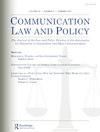Lessig, Lawrence. The Law of the Horse: What Cyberlaw Might Teach, 113 Harv. L. Rev. 501 (1999)
IF 0.2
Q4 LAW
引用次数: 0
Abstract
Cyberlaw taught us everything, actually. The year was 1999 and undergraduate media law professors across the country were hearing what was initially an astounding claim from their students: Illegally sharing and downloading music online were acts of free expression. For seasoned instructors at the time, the statement was initially a source of amusement. For those of us entering the academy, the claim was less surprising. Whatever was going on in this new thing called cyberspace, it would certainly never be the case that music lovers could indefinitely infringe on the copyrights of musicians and their publishers. Indeed, the legal histories of Napster and Grokster, two early music file sharing services that found themselves in frequent legal battles with music publishers, eventually proved the professors right. Infringers were sued, the services were punished, and new business models around online music were birthed. The law seemed to win. Or did it? When Larry Lessig, then a 38-year old law professor at Stanford University, published one of the most-cited and celebrated articles of his career, “The Law of the Horse: What Cyberlaw Might Teach,” and his book, Code and Other Laws of Cyberspace, the media law community seemed to take a collective deep breath. In one fell swoop, Lessig argued that something was fundamentally different for law in cyberspace, a shift so consequential that he felt compelled to take on not only Judge Frank Easterbrook of the United States Seventh Circuit Court of Appeals, who had declared that there was “no more a law of cyberspace than there was a ‘Law of the Horse,’” but also the growingLawrence Lessig。《马的法则:网络法可能教给我们什么》,113 Harv。L.第501版(1999)
实际上,网络法教会了我们一切。那一年是1999年,全国各地的媒体法本科教授都听到了学生们最初令人震惊的说法:在网上非法分享和下载音乐是言论自由的行为。对于当时经验丰富的教师来说,这一声明最初只是一种娱乐。对于我们这些刚进入学院的人来说,这种说法并不令人惊讶。无论在这个被称为网络空间的新事物中发生了什么,音乐爱好者可以无限期地侵犯音乐家及其出版商的版权肯定是不可能的。事实上,Napster和Grokster这两家早期音乐文件共享服务公司的法律历史,最终证明了教授们是正确的。这两家公司发现自己经常与音乐出版商发生法律纠纷。侵权者被起诉,服务受到惩罚,围绕在线音乐的新商业模式诞生了。法律似乎赢了。是吗?当当时38岁的斯坦福大学法学教授拉里·莱西格(Larry Lessig)发表了他职业生涯中被引用最多、最著名的文章之一《马的法则:网络法可能会教什么》(the law of the Horse: What Cyberlaw Might Teach)和他的书《网络空间的代码和其他法律》(Code and Other Laws of Cyberspace)时,媒体法律界似乎集体深吸了一口气。莱西格一下子提出,网络空间的法律发生了根本性的变化,这一变化如此重要,以至于他觉得有必要不仅挑战美国第七巡回上诉法院(United States Seventh Circuit Court of Appeals)的法官弗兰克·伊斯特布鲁克(Frank Easterbrook),后者曾宣称“网络空间的法律并不比‘马的法律’多”,而且还要挑战不断增长的网络空间法律
本文章由计算机程序翻译,如有差异,请以英文原文为准。
求助全文
约1分钟内获得全文
求助全文
来源期刊
CiteScore
0.60
自引率
33.30%
发文量
7
期刊介绍:
The societal, cultural, economic and political dimensions of communication, including the freedoms of speech and press, are undergoing dramatic global changes. The convergence of the mass media, telecommunications, and computers has raised important questions reflected in analyses of modern communication law, policy, and regulation. Serving as a forum for discussions of these continuing and emerging questions, Communication Law and Policy considers traditional and contemporary problems of freedom of expression and dissemination, including theoretical, conceptual and methodological issues inherent in the special conditions presented by new media and information technologies.

 求助内容:
求助内容: 应助结果提醒方式:
应助结果提醒方式:


